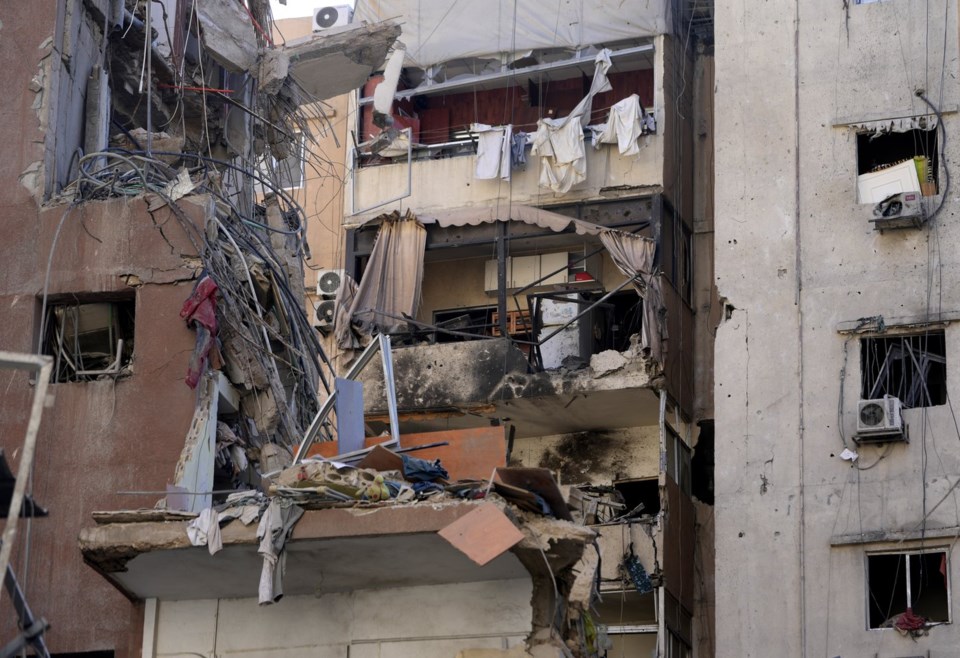OTTAWA — Global Affairs Canada is warning more than 20,000 Canadians in Lebanon that they can't rely on government evacuation flights if war engulfs that country.
The department says 21,399 Canadians have officially registered as being in Lebanon, though it expects many more are present in the country.
Canada has urged people for months to leave Lebanon and not travel there, though diaspora groups say many have gone ahead with travel plans, including visits to family. Peer countries that had not yet ordered citizens to leave did so in recent weeks, as tensions between Israel and Hezbollah militants in Lebanon intensify.
Canada has been planning since last October for a possible evacuation of its citizens, and sent military personnel to Lebanon and Cyprus in preparation. But Canada warns evacuations aren't always possible.
On Wednesday, the government once again urged Canadians to leave Lebanon immediately.
"Some airlines have already temporarily suspended their service to Beirut. Additional travel disruptions are likely, including airspace closures and flight cancellations and diversions," it said on X.
Foreign Affairs Minister Mélanie Joly also posted a warning on X. She said Canadian citizens and permanent residents who are in Canada and thinking about visiting Lebanon shouldn’t go, and those who are currently in Lebanon should come back.
"If tensions escalate, the situation on the ground may not allow us to help you and you won’t be able to leave. Plan accordingly," Joly said.
Lebanese-Montrealer Lamia Charlebois said many Canadians in Lebanon have to choose whether to stay in the country and care for elderly parents, or fly back to Canada early with their children for the start of the school year.
“We're torn … between the motherland and the adoptive land, the parents and the kids. That's the problem,” said Charlebois, who manages a Facebook group with more than 13,000 members dedicated to helping Lebanese newcomers in Montreal.
“It's always the same dilemma. Do you wait a bit and see? Stay with your family, take care of your parents, wait a bit and risk getting stuck or you get out now while you can while leaving your parents under the bombs?”
On Tuesday, Israel carried out a rare strike on the Lebanese capital city of Beirut, which it said killed a top Hezbollah commander. The commander was allegedly behind a weekend rocket attack that killed 12 young people in the Israeli-controlled Golan Heights.
The Israeli strike killed at least one woman and two children and wounded dozens of people.
When Lebanese-Canadians visit Lebanon, it's often not with leisure in mind, Charlebois said, but their anxieties about the country have escalated since Oct. 7, with many Lebanese feeling caught in the war involving Israel, Hamas and Hezbollah.
Natasha Feghali, 28, a Canadian-Lebanese activist and educator based in Windsor, Ont., has relatives in Lebanon, including family from Canada who are visiting the Middle Eastern country. She said she is increasingly worried about them as tensions escalate.
“People who I know who are on holidays, they've already booked tickets to leave early,” she said.
Feghali said summer is normally peak season for Lebanese Canadians to visit Lebanon. She said she is particularly concerned about family who do not have dual citizenship and will have no option but to stay if conditions deteriorate.
“I hope that doesn't happen,” she said about a full-scale war. “And I'm very concerned if it does, where would they go?”
Global Affairs Canada said in a statement, "there is never a guarantee the Canadian government will evacuate Canadians in a crisis situation."
"Canadians should not rely on the government of Canada for assisted departure or evacuation. Government assisted evacuations from a foreign country are an option of last resort, when all means of personal and commercial transportation have been exhausted, and the safety and security of its citizens is compromised."
Canada has recently used military planes to extract citizens from crises in Israel and Sudan to nearby countries, where they could pay for commercial flights home.
This report by The Canadian Press was first published July 31, 2024.
— With files from Joe Bongiorno in Montreal and The Associated Press.
Dylan Robertson, The Canadian Press



